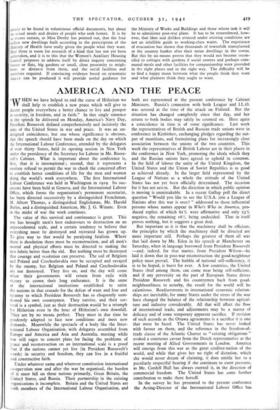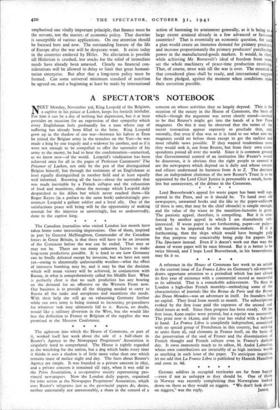AMERICA AND THE PEACE
WHEN we have helped to end the curse of Hitlerism we shall help to establish a new peace which will give to decent people everywhere a better chance to live and prosper in security, in freedom, and in faith." In that single sentence in the speech he delivered on Monday, America's Navy Day, President Roosevelt defined comprehensively and incisively the aims of the United States in war and peace. It was an =- designed coincidence, but one whose significance is obvious, that the Speech should have been made on the day on which the International Labour Conference, attended by the delegates of over thirty States, held its opening session in New York , under the presidency of the Secretary for Labour in Mr. Roose- velt's Cabinet. . What is important about the conference is, first, that it is international ; second, that it represents a resolute refusal to permit the war to check the concerted effort to establish better conditions of life for the men and women doing the world's work everywhere. The first International Labour Conference was held in Washington in 1919. Its suc- cessors have been held at Geneva, and the International Labour Office, which forms the organisation's permanent secretariat, has been directed successively by a distinguished Frenchman, M. Albert Thomas, a distinguished Englishman, Mr. Harold Butler, and a distinguished American, Mr. J. G. Winant. Even in the midst of war the work continues.
The value of this survival and continuance is great. This war has brought men's best endeavours to destruction on an unprecedented scale, and a certain tendency to believe that everything must be destroyed and recreated has grown up. To give way to that would be paralysing fatalism. Where there is desolation there must be reconstruction, and all men's mental and physical efforts must be directed to making the new fabric better than the old. But nothing must be destroyed that courage and resolution can preserve. The soil of Belgium and Poland and Czechoslovakia may be occupied and ravaged by the enemy, but Belgium and Poland and Czechoslovakia are not destroyed. They live on, and the day will come when their governments will return from exile with victory to crown their long endurance. It is the same of the international institutions established to unite the nations in that crusade for the defeat of want and fear and tyranny to which President Roosevelt has so eloquently sum- moned his own countrymen. They survive, and their sur- vival is a symbol, just as their destruction would be a triumph for Hitlerism even in the hour of Hitlerism's own downfall.
They are by no means perfect. They must in due time be prudently adapted to face new conditions and meet new demands. Meanwhile the spectacle of a body like the Inter- national Labour Organisation, with delegates assembled from Europe and America and Asia and Australia, meeting while war still rages to concert plans for facing the problems of peace and reconstruction on an international scale is a proof that if the nations cannot yet live (in President Roosevelt's words) in security and freedom, they can live in a fruitful and constructive faith.
Under whatever name and whatever constitution international co-operation now and after the war be organised, the burden of it -must fall on three nations primarily, Great Britain, the United States, and Russia. Their partnership in the existing organisations is incomplete. Britain and the United States are loth members of the International Labour Organisation, and both are represented at the present conference by Cabinet Ministers. Russia's connexion with both League and I.L.O. was severed at the time of the attack on Finland. But the situation has changed completely since that day, and her return to both bodies may safely be counted on. Here again a coincidence in time is of some significance. Last week the representatives of British and Russian trade unions were in conference in Kiubishev, exchanging pledges regarding the out- put of munitions, and formulating plans for increasingly close association between the unions of the two countries. This week the representatives of British Labour are in their places in the conference in New York, promoting the ideals which they and the Russian unions have agreed to uphold in common. In the field of labour the unity of the United Kingdom, the United States and the Union of Soviet Republics is as good as achieved already. In the larger field represented by the League of Nations as a whole the attitude of the United States has not yet been officially determined. The occasion for it has not arisen. But the direction in which public opinion is moving is unmistakable. In a recent Gallup poll the direct question " Would you like to see the U.S.A. join a League of Nations after this war is over? " addressed to those influential persons whose names appear in Who's Who in America, pro- duced replies of which 61% were affirmative and only 23% negative, the remaining 16% being undecided. That in itself proves nothing, but it suggests a great deal.
But important as it is that the machinery shall be efficient, the principles by which the machinery shall be directed are more important still. Perhaps the greatest of them all was that laid down by Mr. Eden in his speech at Manchester on Saturday, when in language borrowed from President Roosevelt —and, indeed, for that matter, from President Wilson—he laid it down that in post-war reconstruction the good-neighbour policy must prevail. The bubble of national self-sufficiency, it is to be hoped, is burst for ever. A few countries, the United States chief among them, can come near being self-sufficient, and if any perversity on the part of European States drives President Roosevelt and his countrymen back from good- neighbourliness to autarky, the result for the world will be calamitous. Readjustments in international economic relation- ships are inevitable, for many States under the stress of the war have changed the balance of the relationship between agricul- ture and industry considerably. All that will affect the flow of international trade, and adjustments may be a matter of delicacy and of some temporary apparent sacrifice.. If revision of such accords as the Ottawa agreements is a sacrifice it is one that must be faced. The United States has never looked with favour on them, and the reference in the freedom-of- trade clause of the Atlantic Charter to " existing obligations " evoked a courteous caveat from the Dutch representative at the recent meeting of Allied Governments in London. America will emerge from this war as the great creditor-nation of the world, and while that gives her no right of dictation, which she would never dream of claiming, it does entitle her to a peculiarly respectful hearing if she continues to exert pressure, as Mr. Cordell Hull has always exerted it, in the direction of commercial freedom. The United States has some further contribution to make there herself.
In the survey he has presented to the present conference the Acting-Director of the International Labour Office has emphasised one vitally important principle, that finance must be the servant, not the master, of economic policy. That doctrine is susceptible of various applications. On one attention should be focused here and now. The outstanding feature of the life of Europe after the war will be desperate want. It exists today in the countries enslaved by Hitler. No alleviation is possible till Hitlerism is crushed, but stocks for the relief of immediate needs have already been amassed. Clearly no financial con- siderations will be allowed to delay or limit that great humani- tarian enterprise. But after that a long-term policy must be formed. Can some universal minimum standard of nutrition be agreed on, and a beginning at least be made by international action of hastening its attainment generally, as it is being to large extent attained already in a few advanced or favou countries? That is essentially an economic question, for suc a plan would create an immense demand for primary produc and increase proportionately the primary producers' purchasing power in the manufactured-goods markets. It would, in sho while achieving Mr. Roosevelt's ideal of freedom from wan set the whole machinery of peace-time production revolving That, of course, must wait till the war is over. The essential that considered plans shall be ready, and international suppo for them pledged, against the moment when conditions mak their execution possible.























 Previous page
Previous page